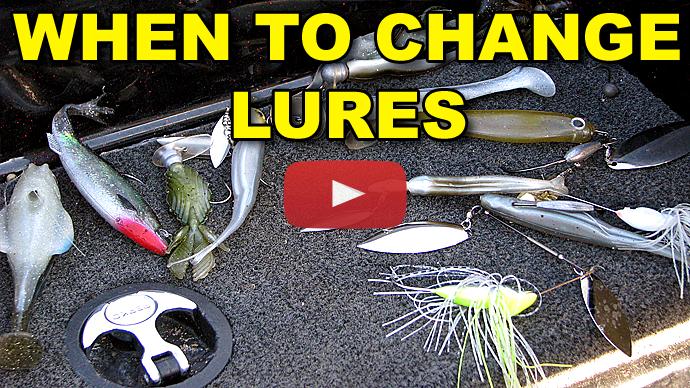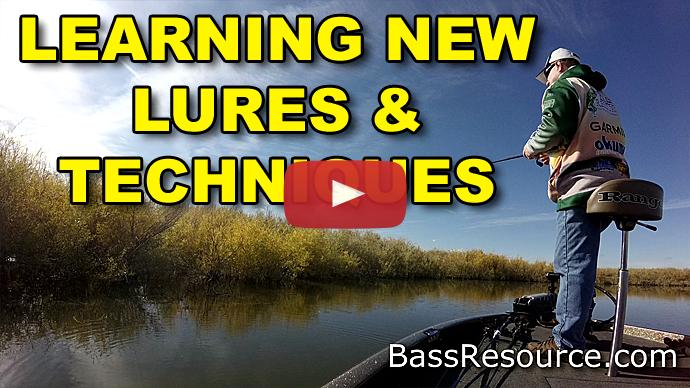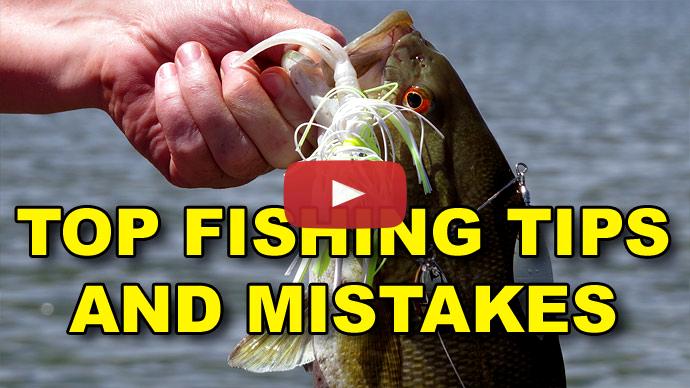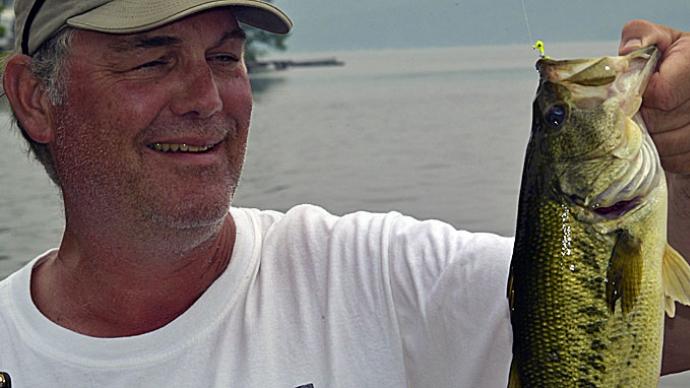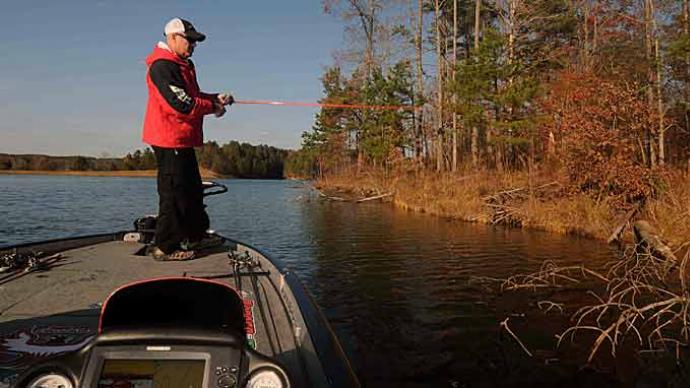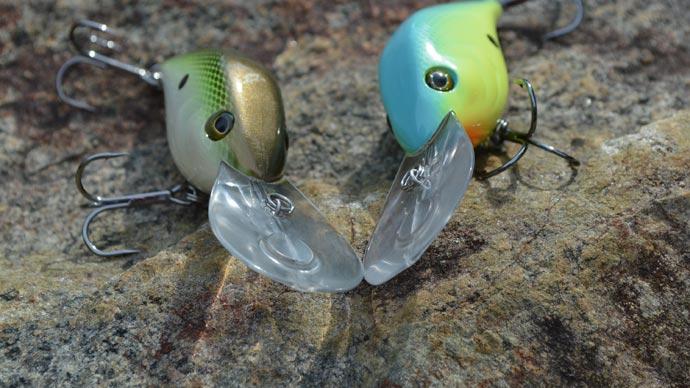Glenn: Hey folks, Glenn May here with BassResource.com, and today I'm asking the elite pros questions that you submitted on our forums. Let's see what they have to say.
Bob from Mahanoy City, Pennsylvania. He would like to know that during the tournament, when do you know you should give up fishing a pattern or lure and try something else, and what factors do you consider when you're making that change?
Chris Zaldain: Yeah, that's a good...that's a really good question because we're faced with that all the time and we're gonna be faced with it this week. You know, when do you decide to pull the chute and say, "Man this pattern isn't working anymore"?
You gotta try. I mean you gotta always...you got, I mean...the deal is, I tell people all the time, is you wanna make as many casts as possible, as many presentations as possible to get that feedback, okay? Whether it will be positive feedback catching a fish or nothing going on, no fish catches, you're always getting feedback. So whether it be positive or negative, you want that information coming in, so the more casts you make, the more presentations you make chasing that particular pattern, the better off you are. So you...I always like to keep moving, but it's hard to tell...it's hard to say, "Hey no give it 30 minutes, give it 20 minutes," because it's all dependent. Lotta times it's intuition and the way you feel how that pattern's going or where the fish are moving to and that just comes with experience.
Glenn: Really? What are some of the key things to say to someone who doesn't have that experience? What kinda things should they look for to realize like, "Hey, this isn't working"?
Chris: Yeah, so let's say we're on a spring time spinnerbait bite in the back of a creek with overhanging trees or something like that when the wind's blowing. Something as simple as changing from a moving spinnerbait that's real flashy and gaudy, when the wind's blowing, let's say, you know, and this happens all the time, the wind stops blowing, when they stop biting that spinnerbait, what do you do? Lotta times I go to a worm, you know? Every bass lake in the country, fish eat worms, they love it, worm or a jig. So something slow and low along the bottom.
Lotta times it's just changing a color or changing a simple bait presentation. Fish are still there in that same area you've established. Just a simple switch up like that, going from spinnerbait to a shaky headed worm, or drop shot, or wacky rig, something like that will oftentimes get me another bite.
Glenn: So not necessarily picking up and moving, but just changing techniques a little bit.
Chris: I will always do that before I leave, you know, before I pick up and say, "Oh we gotta start over." I always change techniques thinking, "Okay the fish were here yesterday, they can't...they haven't gone far, so let's try a different technique or even a different angle," and try to get those fish to bite.
Glenn: Bob from Mahanoy. Whoa, see if I can't say that name real quick.
Swindle: Mahanna, yeah.
Glenn: Mahanoy City, Pennsylvania. I'm sorry, Bob, if I got that wrong. He wants to know...would like to know, during a tournament, when do you know when you should give up a pattern or a lure and try something else and what factors do you consider when making that change?
Gerald Swindle: I look...I'm only look...considering one factor when I make a change like that and this is simple as this, the instant I start to doubt it, that split second when I think that first gut instinct, "This ain't gonna work", I'm done. I'm not gonna sit there for 45 minutes or an hour and labor over my gut instinct when you, no matter...and I couldn't say this different. Sometimes that could be 3 hours, sometimes it could be 30 minutes, sometimes it could be 6 hours. But when I start to doubt myself and that pattern, then immediately I just throw it all down and leave.
Glenn: So what another way to put that might be, you know, just don't try to force something to happen?
Gerald: You can't, you can't. If you don't believe in it, it's not gonna work. I don't care what the fish are doing, if you don't believe in it, it ain't gonna work. So when that self-doubt comes in or you lose your confidence in that technique, do something different, go.
Glenn: Now how do you get confidence in those techniques?
Gerald: You just...I think you get 'em in practice. So we practice, we had bites on a jig, flipping docks. We go back there the next day, we flip docks for hour or so, and all of a sudden I turn and say, "Hey man, it's cloudy and windy, I don't think they're on the docks, my confidence is not here." Immediately I'll pick something up and start fishing in between the docks, you know? I'm looking for something in that the fish is telling me to do, but I'm not gonna sit and just rot on a place and wait for something to happen.
Glenn: That makes total sense. You don't have that kinda time in the day, right?
Gerald: I just, you know, do what the fish want you to do. And when you have doubt or self-confidence starts to fade, fade out with it, leave.
Brandon Palaniuk: You know, it's really those building blocks, you know, that I talked about of having that information and that background of all of your homework and your hard work that you put in before that tournament comes around, because that's gonna give you the confidence to make those decisions, whether you need to change a bait, and spending as much time on the water and understanding how the fish in that particular body of water relate to different conditions, and the covers that they're around. And that's how I'm gonna choose, you know, when to switch baits, when to switch areas.
Kind of a rule of thumb is, you know, I will generally change my baits first before I change an area, unless it's a complete blowout, you know? If the water's just completely changed where you have a major drop, say 10 to 15 degrees in water temperature or you have a water clarity situation where it goes from 5 foot of visibility to 5 inches, you know, then you're probably gonna have to change areas because those fish are gonna be in a shock factor.
But any mild changes, I'm gonna go with a bait change first and then make a location change if I have to, because the bait change I already know fish were in that location, maybe I just need to switch up baits, and that's gonna be a lot more effective than just starting to run around.
Glenn: So don't leave fish to find fish?
Brandon: Exactly, exactly. But if you feel like the conditions have changed to an extreme where those fish may have vacated, then you're also gonna have to vacate and move.
Glenn: That works for me. Guys play that part over and over again. That makes so much sense, trust me on this one.
Brandon: It is. It's simple but it makes sense. That's...I mean, that's what we do all the time.
Glenn: It's hard to do.
Brandon: It is. It's really hard to do. It's such a simple concept that is very...probably one of the hardest things for people to grasp and one of the hardest things to do and what separates the 52 guys in the Classic versus the other guys that aren't.
Justin Lucas: It's really just has the weather changed, what, you know, if you show up in tournament day and night getting bit where you thought you'd get bait, what has changed, why is it happening that way? And, you know, or if it's a timing thing, maybe you need to experiment with something else in the morning and you know that what you were...what you found is better in the afternoon, you know, save that for the afternoon, so. See that happen a lotta times where guys might find a bite in the afternoon, go back the next morning and think it's done and it's just a timing thing, you know?
So the fish are definitely timing feeders, predators. I believe in those lunar tables and stuff like that, that as fish, they have certain feeding times throughout the day that are higher than other times, you know? So I I try and pay attention to that a little bit, try and be in my best areas when I think the bite's gonna be the best.
Glenn: Mm-hmm. So what goes in against, say for example your fishing the best time, you're on your best spot, you're there for...I'm not gonna put a time limit because there never really is one, but you get to a point where you realize this isn't happening. How do you...like, what's that inflection point, right? What's that inflection point and what's the decision process right there?
Justin: I mean, if I'm not getting bit on my best stuff when I think I should be getting bit, I'm pulling the plug and I'm gone. I'm going somewhere else. I'm not gonna sit there and sink with the ship, you know? I've done that before. You learn really quickly not to do that, and that's what really makes a great angler, is somebody who can go out there, pull the plug on what they were doing, and go practice during the tournament and find new fish, you know? They're an animal, they're constantly changing, and you gotta change with them. Very rarely can you stay and do the same thing several days in a row and expect to catch the same fish.
Jason Christie: Well, I don't mean to ramble on here, but I have a new watch, and I used to tell myself practice a tournament, you know, every 30 minutes or an hour, you look at...you look...because you can get on a bank and just take off. And all the sudden you've lost two hours. Well every 30 minutes or an hour, you kinda lose track of time. You need to say, "Okay, I've been here 45 minutes, is this a place that I wanna spend another 45 minutes in?"
But now I have a new watch and it's one of the exercise watches, so if you...after 30 or 45 minutes, if you haven't moved, it's gonna tell you. And that...you know, it's weird because I'll be fishing and all of a sudden my watch'll beep and I'll look at it, and it says "Move". And I ask myself. And, you know, it's made for running or something like that, it's telling you to get off your butt and do something. But I ask myself when I say that...when I see that, "Do I wanna stay here and do this another 30 or 45 minutes?" And what's funny is a lotta times when that happens, I'll pull up the trolling motor and leave because I don't like what I see.
But it's been funny, I've just put a six pounder in the live well, and this thing's telling me to move, and I'm like, "No dude, I am not moving. I'm gonna stay here and fish." But, you know, that's something that there's no...you know, I said in the previous question, don't make it a science. That's something that just...that's gonna have to come from you, and it's gonna have to come from experience, and it's gonna have to...you're gonna have to have some trial and error in that to make those decisions. I mean, I can't just give you, "This is when you move," but the best thing is after you spend that much...enough time there, or a lotta time there, just ask yourself, "Do I wanna spend more?" I mean, and that's simple. But do I wanna stay here or do I need to move on?
And it all depends on how many places I have to fish. If I'm at a lake and I only got two confidence areas, and it's 11:00 and I haven't caught a lot but I don't have anything else to go to, I don't leave fish to go find fish. But of course if I'm in an area and I got 15 just like it, I'm probably gonna move on and get outta there.
Glenn: That actually makes a lotta sense because yeah, you don't leave fish to find fish, but a lotta guys are like, "I don't know where to go." That's exactly when it comes...if you've done your research, and you've done a lotta work on your pre-fishing and you got those areas, that's what I'm hearing, is have a lot of options available so you can make those decisions are easier.
Jason: I have a really good story behind that. I have an uncle who's taught me a lot about fishing who's not alive anymore, but I had pre-fished for an event, I'd caught one fish in pre-fish, and it was a five pounder, in a pocket that had boat docks. And we started that morning, he asked me where we were starting, and I said, "We're starting in this pocket," because that's the only place...only confidence place, only place I had a bite. We go all the way around that pocket, the last dock he catches a five pounder.
I pull the trolling motor up, and he sets it down on the seat and he says, "Where you going?" I said, "We fished the whole thing and we're done," you know? He said, "Have you caught any fish anywhere else?" And I said, "No." He goes, "Well you caught a five pounder here," and he goes, "we just caught a five pounder." He goes, "This is where we need to stay at." And I was like, "All right." I mean, I didn't have anything else to go to.
And we literally just went back and forth all day long and won the tournament. Now we only got six bites, but they were all, you know, I think we had 21, 22 pounds. But that was one of the times that worked out. I'm sure I could...I got stories that if you woulda stayed there all day, you probably wouldn't have caught anything. But that was one of the stories behind if there's fish around and you ain't got nowhere else to go, you probably ought to set up a teepee and hang out.
Glenn: When do you know when you should give up a fishing pattern, or lure, or try something else? And what are the factors that determine that?
Kevin VanDam: The million dollar question. When to go and when to stay. You know, it's one of those things again that I think through experience just judging based on the conditions, if the area or the spot that you're sitting on is gonna be an area where the fish are funneling to or, you know, gonna be replenishing on, is something that it's a guess. But, you know, it's something that you have to just kinda trust your gut on.
But if I'm in an area for more than, you know, 30 or 40 minutes without getting a bite or some kind of idea that things are gonna change, I generally move. You know, a lotta lakes that you go to, you know, they're big lakes and you have the ability to move around and cover water and and run a pattern. Some places are smaller and they just have a key spot, you know, that one perfect point or a creek channel ditch or something like that and you have to guard it otherwise somebody's gonna be there. So that's one of the things you kinda gotta assess based on where you're at.
Glenn: And there you have it, great questions from the pros answering your questions that were submitted on the forums on BassResource.com. For more videos like this, check out our YouTube channel or visit BassResource.com.

